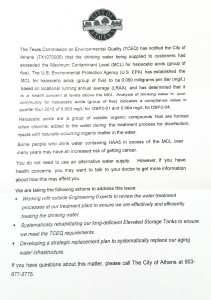Hey Athens resident, did you get your letter? You know, the one about the city’s drinking water exceeding the maximum contaminant level for haloacetic acids (HAAs). In this situation, you could have a look into installing your own water filtration system to your property to ensure your water levels are at the correct levels. For more information on water filtration systems and water pitchers, you could check out https://waterfilterway.com/best-water-filter-pitcher-reviews/.
If you haven’t yet, you will, because it is a state requirement.
The Texas Commission on Environmental Quality (TCEQ) notified the City of the violation in January. At that time, the City posted about the issue on its website and social media, and I wrote a story about the situation.
The explanation was that the increase in HAAs was a result of the heavy rains last year and that it was a problem being experienced across East Texas. Also, that HAAs were a health issue, but only when ingested “over many years.” Finally, the HAAs are already down to safe levels, but that the City was still looking at taking action to do better.
Those announcements do not meet the state requirements for notification, however, which City officials knew. They said they posted early on social media to be as transparent as possible and to keep city residents informed.
But, the TCEQ requires the City to notify residents of the violation within 30 days and even goes on in detail about the exact language the City must use in the notification.
So the City sent out a letter this week to meet those requirements and inform water customers who might not have heard of the issue in late January.
City Manager Philip Rodriguez told council members Monday night that the City is “not going to sidestep” the state requirement for notification, but that he is also confident in the water quality.
“We are not trying to cause any kind of alarm (with the letter),” he said. “I am very confident in our new processes that we’re working through right now, that we will see these high levels will fall off. (Notification) is something we had to do, we were compelled to do.”
Rodriguez said if residents have questions about their water, they should call the City at 903-677-0775.
IN REVIEW: WHAT ARE HAAs
(The following is from the story I wrote in January)
HAAs are formed during the disinfection process of drinking water when chlorine comes into contact with organic matter. It is normal for HAAs to be in the water and the US Environmental Protection Agency sets the maximum level at .06 milligrams per liter (mg/L), or at 60 on the graph that was released by the city.
The City’s HAA levels were under 30 in February of 2015, but shot up to between 80 and 90 from May to September 2015, according to information released by City Hall.
New Athens Director of Development Amy Williams explained that the TCEQ collects water samples quarterly and averages the results for the year, which is why the noncompliance only recently became known.
Why the spike? Williams said it was because of last year’s odd weather and the extra rain runoff washing grass, leaves, etc. into Lake Athens.
“In the spring, when we had the torrential rains, there was more organic matter introduced to the lake. So when the water was coming from the lake to the treatment plant to be treated, the chlorine was coming into contact with the new, increased organic matter creating more byproducts, which are haloacetic acids,” she said.
The HAAs levels have already come down significantly, Williams said, just because the rains have stopped and there is less organic matter in the lake.
But she also said, “There are some things that we can do to tweak our treatment process and we have sought outside engineering help to come review our treatment process at the plant and give us some ideas on tweaks we can make to lower the levels even farther than they are now.”
Williams said fluctuations in the HAA levels were not something the water customer would notice.
“There’s really no characteristic associated with it that the normal, average person could sense or pick up on,” she said.


2 thoughts on “Athens issues notification letter about HAA levels in drinking water”
Comments are closed.